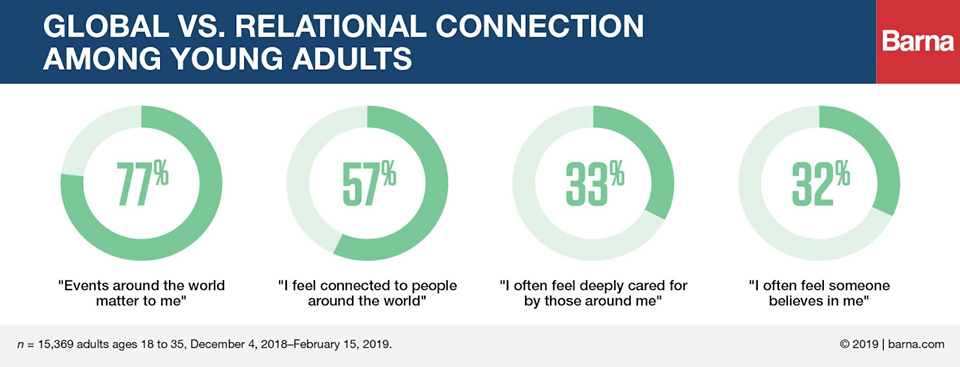Young people are looking for an emotionally connected church
One that puts faith in action, new report finds
Australian Millennials and Gen Z – those aged 18-35 – don’t just want to be “reached”, they want to be involved and make a difference, according to a new report released today from Barna, World Vision Australia and Alpha Australia.
The report, called The Connected Generation, is the culmination of a survey of 15,000 adults aged 18-25 in 25 countries, including over 1000 respondents from Australia, and aims to better understand the younger generation and their attitudes to church. It is the largest study Barna has ever conducted.
The report showed that young Australians, in particular, were feeling “lonely and isolated”: 34 per cent of those surveyed said they were lonely and isolated, while only 33 per cent said they felt “deeply cared for”. Australia was one of the only countries in the survey to have more people say they felt lonely than cared for.
Meanwhile, three in ten people in Australia and New Zealand met Barna’s definition of anxiety, defined as “often feeling at least three of the following emotions: ‘anxious about important decisions’, ‘sad or depressed’, ‘insecure in who I am’ or ‘afraid to fail’.”
“It’s more important than ever for the church to understand the emotional climate.” – David Kinnaman
David Kinnaman is president of Barna Group in the United States, and author of bestselling books including You Lost Me and unChristian – which both explore why young people are leaving the church. He is currently in Australia to release The Connected Generation and told Eternity that young people are looking for an “emotionally connected church” that can help to counter high levels of isolation.
“It’s more important than ever for the church to understand the emotional climate and how to create an emotionally healthy community to be able to match up to the concerns that this generation is bringing to the table,” said Kinnaman.

The vast majority of young adults feels the impact of broad, global trends more than they feel loved and supported by others close to them: Barna Barna
Those issues include anxiety about vocation and finances in a generation coming of age in, what Kinnaman described as, a “chaotic time”.
“Though they tend to be less religious, anxious respondents who do participate in communities of worship cite more relational reasons for doing so,” reads the report.
Kinnaman says it’s important that the church tells a story of hope about this “connected generation”, which so often cops a bad rap in the media and among our churches.
“There is a vibrant group of young people in every place we surveyed who are committed to the church; there are plenty of signs of hope. It’s a generation that’s more spiritual than we expected, more positive towards Christianity. And the levels of resilience were quite high amongst those who are connected to the church,” he said.
“There are plenty of signs of hope. It’s a generation that’s more spiritual than we expected, more positive towards Christianity.” – David Kinnaman
Australia does, however, have some of the higher drop-out rates among young people who are leaving the church. Globally, the church drop-out rate among Millennials and Gen Z is 57 per cent. In Australia, that number is 71 per cent.
Kinnaman says the drop-out rate has a lot to do with the story the church tells about itself. The report suggests there is confusion about what and who the church should represent, and there is no clear consensus on the primary markers of Christian identity.
“Some of the most effective churches with Millennials and Gen Z are very active in not falsely representing what the Christian community is all about. They take the idea of hypocrisy or other kinds of emotional challenges – passive aggressiveness, dealing with bad leaders or the stupid things that Christians say to each other – and they work hard to make young people resilient about our disappointment with church people. So, teaching them that that’s not the time when you say that it’s time to leave, that’s the time when you lean in. We’re all hypocrites, aren’t we? Successful churches with the younger generation attend to those human realities,” said Kinnaman.
“Churches need to be more aware of those experiences and the hurt, the disappointment, the cynicism that young people are experiencing. And they can qualify programs and worship and conversations with a sense that allows the Holy Spirit to speak into the failures. This generation is really watching for that authenticity.”
“They want the church to be a laboratory of leadership, not just a place for spirituality. They want their faith to intersect with the realities of life and address social issues.” – David Kinnaman
Similarly, young people are looking for churches that connect them to something greater than themselves in more practical ways.
According to the report, nearly half of Millennials and Gen Z globally are involved in a cause they care about. They are especially likely to invest in local initiatives. In Australia, climate change and pollution stand out as top reasons for global concern.
“The connected generation is looking for the church to provide real, tangible, meaningful, developmental opportunities,” says Kinnaman. “They want the church to be a laboratory of leadership, not just a place for spirituality. They want their faith to intersect with the realities of life and address social issues.”
The report showed churches in Australia have a long way to go on this, with only 24 per cent of young Australians saying they have found a cause or issue that they’re passionate about through their church.
Kinnaman says he hopes the study will bring more understanding across generations in the church.
“We’ve gained unique insights into spiritual development today and a wide-angle lens on the most pressing issues and concerns facing Millennials and Gen Z – cohorts who are much talked about and often misunderstood. In addition to providing many hopeful signs about the opportunities ahead of these generations, the study shows powerful connections between practicing faith and overall well-being. We anticipate the findings will help Christian leaders of all ages partner with the emerging generations globally to take advantage of their unique ‘connected’ moment.”
Barna, World Vision Australia and Alpha Australia are running a series of events on the future of faith for emerging generations. Click here for more.
Email This Story
Why not send this to a friend?



